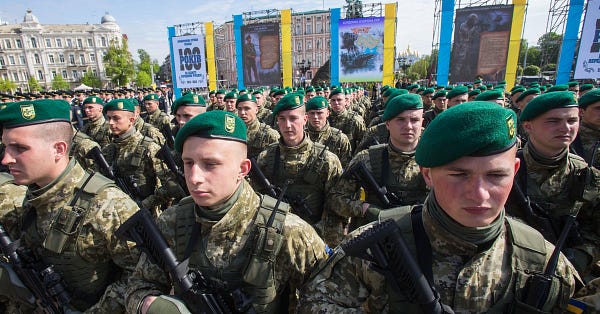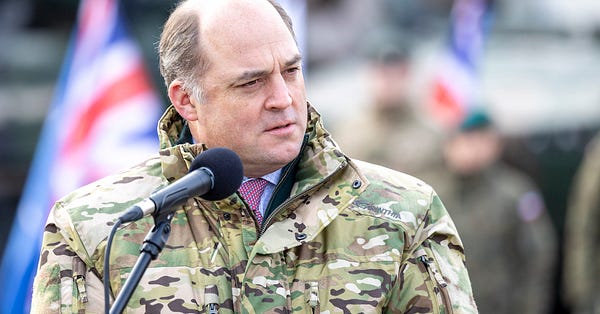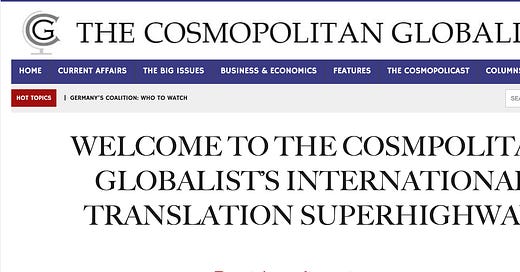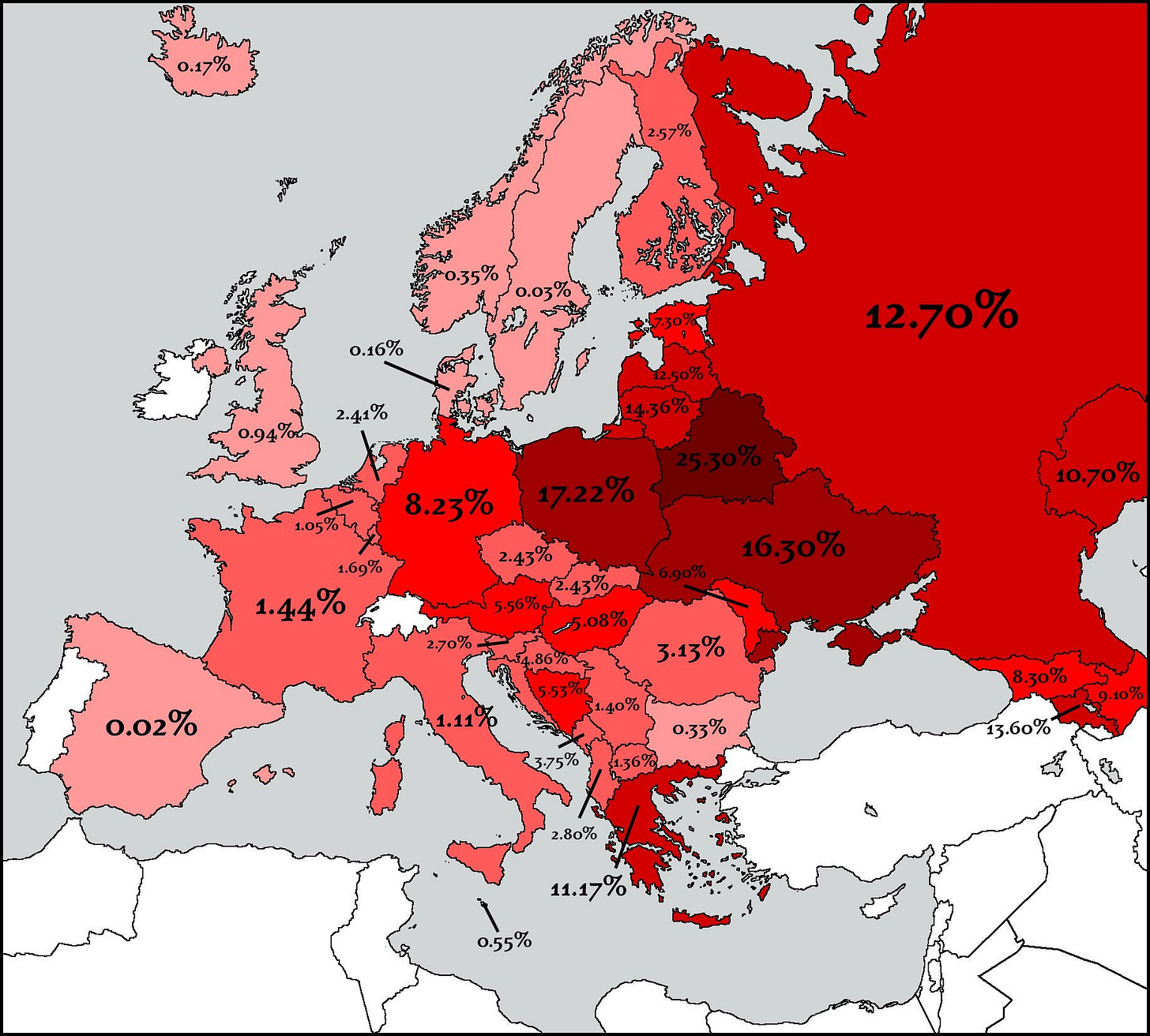The guns of January
Prewar. Plus: The debut of the International Translation Superhighway. Plus: Global Eyes, Russia War Edition
The Russian media is calling it “Cuban Missile Crisis 2.0.” The New York Times isn’t calling it anything.
In light of the gravity of the situation, we’ve put together a special Global Eyes reading list on the Russia crisis below. We’ve also debuted the prototype of our International Translation Superhighway—from Russian to English—for our subscribers. The link is below the jump.
By the Cosmopolitan Globalists
Vladislav Davidzon writes, Ukraine Can’t Afford Presidential Prosecutions:
The Zelensky administration is taking a very dangerous step in moving against an internal political opponent at the same moment that a lively debate has broken out on how to help secure its sovereignty among the expert community in Washington. The newly opened case against former president Poroshenko is seen by critics within Ukrainian civic society as an instance of selective prosecution. By moving against his predecessor, Zelensky runs the risk of squandering the accumulated national reserve of international good will just as it is critically needed to deter the threatened Russian military escalation.
Nicolas Tenzer writes, Why the West failed on Ukraine.


David Patrikarakos writes, Why Biden has sacrificed Ukraine:
… the US is backing its most important EU partner: Germany, which wants to decouple the pipeline from any EU or Nato-wide sanctions package. Europe sucks on Russian gas like a crackhead on his pipe. And how many junkies can realistically sanction their dealer? Germany is weak here; and the US is made to look weak by proxy.
Global Eyes: Russia crisis
Blinken to travel to Ukraine and Germany this week.
What are Russia’s military options in Ukraine? “An attack against Sweden cannot be ruled out,” warned Peter Hultqvist, Sweden’s defence minister, on January 15th, pointing out that Russian landing ships had entered the Baltic Sea. “Sweden will not be caught napping if something happens.”
TRY THE INTERNATIONAL TRANSLATION SUPERHIGHWAY
What’s the International Translation Superhighway?
How do I make the Translation Superhighway work?
Tell us what you think! It’s in a very early stage of development. This is just to show you, roughly, what we have in mind. (And what Russia has in mind.) We anticipate making pages like this for all of the world’s major languages. Please give it a try, experiment with it, and tell us whether you find it intuitive, easy to use, and elucidating.
British C-17s carrying arms to Ukraine fly around German airspace. (Claire: Following observations that the UK’s planes were flying around Germany, the UK and Germany immediately denied that German airspace had been closed to the RAF. But then why were these planes flying around Germany? No one knows.)
A video dispatch from Ukraine:




British troops sent to Ukraine as Defence Secretary warns of ‘very, very bloody war’ with Russia. “Britain last night sent troops and hi-tech weapons to Ukraine in a bid to thwart a feared Russian invasion. In a clear signal to Vladimir Putin, two RAF transporters flew badly needed missile systems to Kiev’s forces. Troops were aboard the planes and will remain in Ukraine to teach their counterparts how to combat Russian tanks.”
Ukraine is officially doomed:



Russia thins out its embassy in Ukraine, a clue to Putin’s next move. “The slow evacuation may be part propaganda, part preparation for a conflict or part feint, Ukrainian and US officials say. It could be all three.”






Moscow’s sanction-proofing efforts weaken western threats. “While Russia has stress-tested its economy and built up reserves, Europe has not reduced its energy dependence.”
Why Germans are so ambivalent about Russia. “Germans and Russians share a long history of attraction and repulsion, fear and embrace, conflict and harmony. That endlessly complicates their relations today.”
US, EU drop idea of removing Russia from Swift. “Nations involved believe that excluding Russia could destabilize financial markets in the short term, and would help develop an alternative, non-Western dominated infrastructure.”
Russia’s attack on the European security order: Germany must act. An Open Letter by 73 German experts on eastern Europe and international security, first published in German by Zeit Online.
There are now more atomic warheads stored in Russia than in NATO’s three nuclear-weapons-states—the United States, Great Britain, and France—combined. Moscow maintains a wide range of delivery systems for its thousands of nuclear weapons, from intercontinental ballistic missiles to long-range bombers to nuclear submarines. It has one of the three most powerful conventional armies in the world, as well as veto power in the UN Security Council. The Russian Federation is thus one of the militarily most secure states in the world.
The Kremlin uses regular and irregular troops, as well as Russia’s nuclear threat potential, to wage various wars and permanently occupy territories of former Soviet republics. Not only in Eastern but also in Western Europe as well as on other continents, the Kremlin unabashedly demonstrates a claim to special rights to enforce its interests on the territory of sovereign states. Circumventing international rules, treaties and organizations, Moscow hunts its enemies around the world. The Kremlin tries to undermine electoral processes, the rule of law and social cohesion in other countries with propaganda campaigns, fake news, and hacker attacks, among other things. The latter is done partly in secret, but with the obvious goal of obstructing or discrediting democratic decision-making in pluralistic states. In particular, the political and territorial integrity of democratizing post-Soviet transition states is to be undermined.
As Europe’s largest economic power, Germany has been watching these activities critically but largely inactively for three decades now. … The crimes of Nazi Germany on the territory of today’s Russia in 1941-1944 cannot justify contemporary German restraint in reacting to the revanchism and international legal nihilism of the Kremlin.
Finally, if you don’t already know about it, the Ukraine Liveuamap is an indispensable tool.
Today’s stern but sly scolding from Russia Today
Blinken’s blinkered vision of Russia
“One lesson of recent history is that once Russians are in your house, it’s sometimes very difficult to get them to leave.”
The level of hubris-laced ignorance it would take an ostensibly intelligent, well-informed individual to make such a statement, in public, in an official capacity, goes beyond political parody.
And yet, there was the American Secretary of State, Tony Blinken, uttering those words at the tail end of a press statement where he questioned the legitimacy of Russia’s dispatch of military forces to Kazakhstan. …
Map of the day
Percentage of population lost in the Second World War:
TRY THE COSMOPOLITAN GLOBALIST’S INTERNATIONAL TRANSLATION SUPERHIGHWAY
Be sure to let us know what you think of it.








Alright, I understand TCG is not fond of the NYT. However, their coverage of the Russia-Ukraine situation has been extensive and detailed, notwithstanding a recent front page which had nothing of that ilk above the fold. If you wish to be critical of coverage in other media, do it credibly lest it detract from your own.